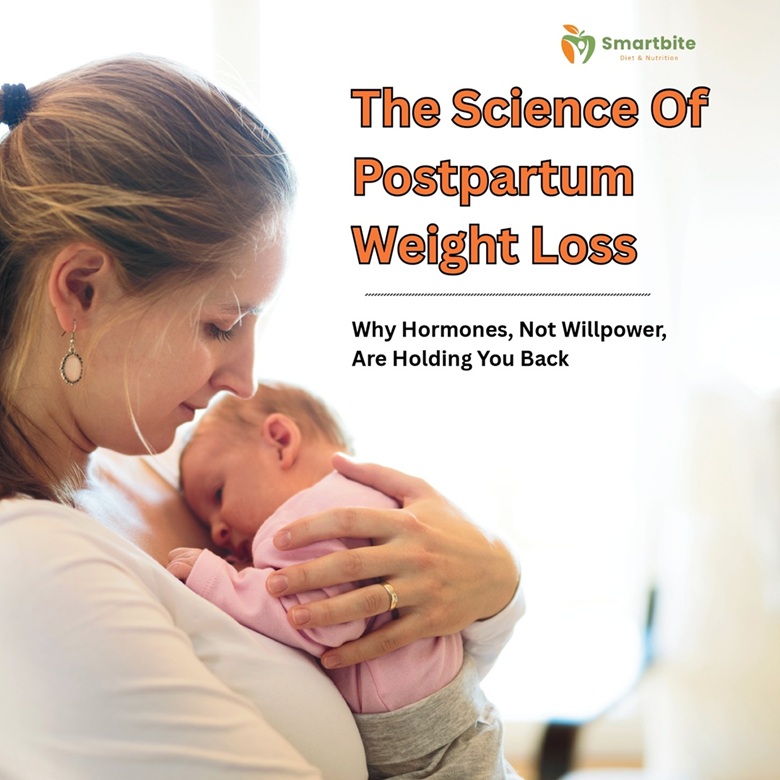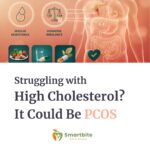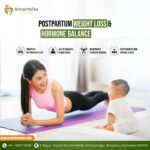Bringing a baby into the world is a remarkable journey, but for many new mothers, the weeks and months after childbirth can feel like an uphill battle—especially when it comes to postpartum weight loss.
If you’ve been cutting calories, exercising whenever possible, and still not seeing results, here’s some good news: it’s not about a lack of willpower. It’s your hormones, and understanding them is the key to achieving sustainable, healthy weight loss after pregnancy.
Many women search for “how to lose weight after delivery” or “postnatal weight loss tips” but the real secret lies in knowing how hormonal imbalance after pregnancy affects your metabolism and fat storage.
Understanding the Hormonal Shift After Birth
During pregnancy, your body experiences powerful hormonal changes to support your baby’s growth and prepare for birth. After delivery, these hormones don’t just snap back overnight. In fact, hormonal imbalance is one of the main reasons postnatal weight loss can be slow or inconsistent.
Estrogen and Progesterone: These hormones plummet rapidly after childbirth, causing fluid retention, mood fluctuations, and changes in appetite regulation.
Prolactin: This is the hormone responsible for milk production. While breastfeeding can burn calories, prolactin also increases appetite and can slow down fat breakdown.
Cortisol: Known as the stress hormone, cortisol levels often stay elevated in new mothers, especially when sleep is disrupted. High cortisol is linked to fat storage around the abdomen and postpartum belly weight.
Insulin Resistance: After pregnancy, many women experience temporary insulin resistance, making it harder to regulate blood sugar levels and burn fat efficiently.
These hormonal shifts are not your fault, and no amount of willpower can override them. Instead of pushing harder, the smarter approach is to work with your hormones, not against them.
How Hormones Impact Your Metabolism
Your metabolism is like your body’s engine — it determines how efficiently your system converts food into energy. After giving birth, your metabolic rate may temporarily slow down due to fluctuating hormone levels and your body’s effort to recover.
- Elevated cortisol encourages the body to hold on to fat as an energy reserve.
- Lower estrogen may decrease lean muscle mass, which in turn lowers your metabolic burn.
- Disrupted sleep can alter hunger hormones like ghrelin and leptin, making cravings harder to control.
This is why many women notice they’re eating well and moving their bodies but the scale refuses to budge. It’s a biological response, not a personal failure. Understanding this helps you approach postpartum weight management with patience and strategy.
Evidence-Based Strategies to Support Postpartum Hormonal Balance
- Prioritise Restorative Sleep
Easier said than done, but even short power naps can help stabilise cortisol and reset your hunger hormones. Quality sleep is one of the most underrated tools for postpartum fat loss. - Eat to Regulate Blood Sugar
Focus on high-fibre carbohydrates, lean protein, and healthy fats to keep insulin levels steady. Avoid crash diets—they can spike cortisol and slow recovery. A well-balanced diet for postpartum weight loss nourishes your body and supports milk production. - Incorporate Strength Training
Gentle bodyweight exercises (once cleared by your doctor) can rebuild muscle, boost metabolism, and balance estrogen levels — all key factors in hormone-based weight loss after pregnancy. - Support Your Thyroid Function
Some women develop postpartum thyroiditis, which can impact energy and weight. Regular check-ups and nutrient-rich foods like iodine, selenium, and zinc help support thyroid health naturally. - Stay Hydrated and Manage Stress
Hydration aids hormonal detoxification, while stress-management practices such as breathing exercises, meditation, or light walks can reduce cortisol and aid natural hormone balance after pregnancy.
Why Willpower Alone Isn’t the Solution for Postpartum
The old saying “eat less, move more” doesn’t work for postpartum weight loss because your body is healing, not dieting. Pushing yourself harder can backfire — raising cortisol levels and slowing progress.
Real change happens when you give your body the environment to rebalance hormones naturally, restore metabolism, and build sustainable habits. That’s why postnatal weight loss is a biological journey, not a battle of discipline.
When to Seek Medical Help
If you’re several months postpartum and still struggling with fatigue, mood swings, or stalled weight loss despite healthy habits, consult your doctor. Conditions like postpartum thyroid dysfunction, insulin resistance, or hormonal imbalance may need professional guidance.
A dietitian for postnatal weight loss can help you design a personalized plan to balance hormones, regulate blood sugar, and lose baby weight naturally without affecting breastfeeding.
Conclusion
Postpartum weight loss is not a race — it’s a recalibration. Your hormones, not your willpower, are at the steering wheel in these early months. By understanding what’s happening beneath the surface, you can make smart, compassionate choices that align with your body’s needs.
With the right guidance, nutrition, and mindset, you can balance hormones naturally, boost metabolism, and achieve healthy post-pregnancy weight loss that lasts.






